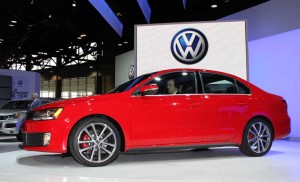Long operating deep in the red, Volkswagen’s U.S. sale unit is on track to turn a profit for the first time since 2003, according to the German maker’s top American executive.
“This is our expectation,” Jonathan Browning, Volkswagen Group of America’s president and chief executive officer told reporters after an appearance at the Society of Automotive Analysts’ annual strategic planning summit.
VW’s luxury arm, Audi saw its North American sales operations become profitable last year, Browning added, in the face of steady growth in demand.
“This is a very narrow definition of profitability,” Browning cautioned, noting that it doesn’t include financial statements from the company’s parts distribution network, nor does it include the share of corporate overhead allocated to North America by VWGoA’s parent company in Wolfsburg, Germany.
Those allocated costs include a $1 billion investment for the new Volkswagen assembly plant in Chattanooga, Tennessee, which opened in May and began delivering finished vehicles to dealers around the U.S., Canada and Mexico earlier this month.
“Our goal is be profitable on a fully allocated basis by 2013,” said the British-born Browning, during his presentation to the SAA.
VW has struggled for years. The biggest automotive importer in the 1960s, it lost momentum following the twin oil shocks of the 1970s, ceding dominance to Japanese importers like Toyota and Honda. At one point in the early 1990s, the VW brand’s annual sales slipped to barely 50,000, Audi dipping to 12,000. Both brands considered abandoning the American market – as several other European marques, including Fiat, Peugeot and Renault had already done.
The maker decided to stick it out but sales continued a roller-coaster ride until recently, analysts stressing that VW simply wasn’t taking the necessary steps to control quality and develop products specifically for the American market.
That began to change several years ago as the automaker announced plans to become the dominant global auto company by 2018, with the U.S. suddenly seen as critical to that goal. With the States targeted for a nearly tripling of sales – to 600,000 annually for the Volkswagen brand alone – the maker announced plans to build the new Chattanooga plant and to introduce products specifically geared to American tastes.
That product blitz began last year with a new, low-priced version of the compact Jetta and continues with the new Passat coming out of the Tennessee plant, a model larger, wider and less costly than the European version.
So far this year, VW’s sales in the United State have increased by 21%, with the new Jetta playing a major role – though the availability of new, high-mileage diesels has also helped. The German automaker also is now closing in on a goal of selling 300,000 vehicles this year, he added.
The introduction of the new, Chattanooga-built Passat and the redesigned Beetle are only expected to add to VW’s growth, most analysts predict.
As sales expand, VW also said it will add a new regional sales office in Dallas, Texas to handle the increased traffic. The Dallas office has been designated as the “South Central Region,” and will support approximately 96 dealers in 16 states, including Texas, Browning said.
The creation of the new Dallas office also creates a separate region to handle sales in California, the most important car market in the U.S. and along the West Coast where automotive brands from Asia and Europe have traditionally been strong.
“As Volkswagen’s sales continue to climb following the official opening of our new U.S. plant in Chattanooga, and as our vehicle line-up expands, it is imperative that we maintain a strong connection with our customers and dealer body,” Browning said.
VW’s solid improvements this year are especially significant considering the weak American economy that will likely leave the market failing to reach the 13 million target many automakers had hoped for in 2011.
“The U.S. car market recovery is slower than we would have predicted a year ago,” said Browning, “but it is a recovery.”

